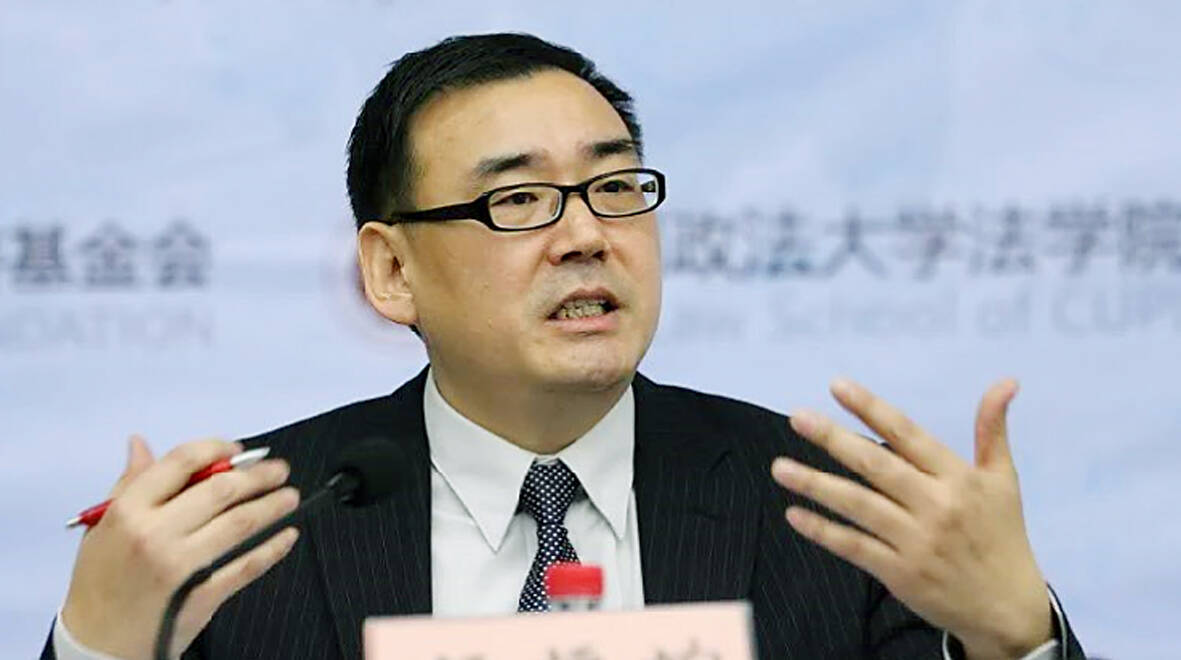An Australian academic jailed in China on espionage charges fears he will die in prison if he does not receive medical treatment, his friends said yesterday.
Chinese-born Australian Yang Jun (楊軍) has been jailed in China since 2019, accused of spying in a closed trial that was heavily criticized by human rights groups.
Yang’s ailing health has been caused by a large cyst growing on his kidney, which has come to the attention of Australian diplomats who have visited him in detention.

Photo: REUTERS
“If something happens with my health and I die in here, people outside won’t know the truth,” he said in a note shared with friends and supporters. “If something happens to me, who can speak for me?”
Political scientist Feng Chongyi (馮崇義), who was detained and questioned by Chinese authorities in 2017, said he had grown increasingly concerned about his friend’s health.
“These prisons, or detention centers, are unable to provide decent medical treatment,” Feng said. “It deeply worries me. When they talk about having a major operation to remove the cyst, that may endanger his life.”
Yang, who denies the spying claims, was arrested on a rare trip back to China in January 2019. The writer and academic — who also goes by his pen name Yang Hengjun (楊恒均) — has previously told supporters he was tortured at a secret detention site and fears forced confessions could be used against him.
His closed-door trial was heard in Beijing in mid-2021, with Yang still awaiting the verdict.
A spokesperson for Australian Minister for Foreign Affairs Penny Wong (黃英賢) yesterday said that the government in Canberra had “deep concerns” about the “ongoing delays in his case.”
“Chinese judicial authorities are handling the case in strict accordance with the law ... and are fully respecting and protecting the consular rights of the Australian side, including visits,” Chinese Ministry of Foreign Affairs spokesman Wang Wenbin (汪文斌) said.
Canberra’s improved relationship with Beijing has ignited a renewed push to free Yang as well as jailed Australian journalist Cheng Lei (成蕾), who also faces vague espionage charges.
Cheng described her bleak prison conditions in a note dictated to Australian officials from her cell.
“I miss the sun,” read the message, described as a “love letter” to Australia.
“In my cell, the sunlight shines through the window but I can stand in it for only 10 hours a year,” she wrote.

DAREDEVIL: Honnold said it had always been a dream of his to climb Taipei 101, while a Netflix producer said the skyscraper was ‘a real icon of this country’ US climber Alex Honnold yesterday took on Taiwan’s tallest building, becoming the first person to scale Taipei 101 without a rope, harness or safety net. Hundreds of spectators gathered at the base of the 101-story skyscraper to watch Honnold, 40, embark on his daredevil feat, which was also broadcast live on Netflix. Dressed in a red T-shirt and yellow custom-made climbing shoes, Honnold swiftly moved up the southeast face of the glass and steel building. At one point, he stepped onto a platform midway up to wave down at fans and onlookers who were taking photos. People watching from inside

A Vietnamese migrant worker yesterday won NT$12 million (US$379,627) on a Lunar New Year scratch card in Kaohsiung as part of Taiwan Lottery Co’s (台灣彩券) “NT$12 Million Grand Fortune” (1200萬大吉利) game. The man was the first top-prize winner of the new game launched on Jan. 6 to mark the Lunar New Year. Three Vietnamese migrant workers visited a Taiwan Lottery shop on Xinyue Street in Kaohsiung’s Gangshan District (崗山), a store representative said. The player bought multiple tickets and, after winning nothing, held the final lottery ticket in one hand and rubbed the store’s statue of the Maitreya Buddha’s belly with the other,

‘NATO-PLUS’: ‘Our strategic partners in the Indo-Pacific are facing increasing aggression by the Chinese Communist Party,’ US Representative Rob Wittman said The US House of Representatives on Monday released its version of the Consolidated Appropriations Act, which includes US$1.15 billion to support security cooperation with Taiwan. The omnibus act, covering US$1.2 trillion of spending, allocates US$1 billion for the Taiwan Security Cooperation Initiative, as well as US$150 million for the replacement of defense articles and reimbursement of defense services provided to Taiwan. The fund allocations were based on the US National Defense Authorization Act for fiscal 2026 that was passed by the US Congress last month and authorized up to US$1 billion to the US Defense Security Cooperation Agency in support of the

HIGH-TECH DEAL: Chipmakers that expand in the US would be able to import up to 2.5 times their new capacity with no extra tariffs during an approved construction period Taiwan aims to build a “democratic” high-tech supply chain with the US and form a strategic artificial intelligence (AI) partnership under the new tariffs deal it sealed with Washington last week, Taipei’s top negotiator in the talks said yesterday. US President Donald Trump has pushed Taiwan, a major producer of semiconductors which runs a large trade surplus with the US, to invest more in the US, specifically in chips that power AI. Under the terms of the long-negotiated deal, chipmakers such as Taiwan Semiconductor Manufacturing Co (TSMC, 台積電) that expand US production would incur a lower tariff on semiconductors or related manufacturing